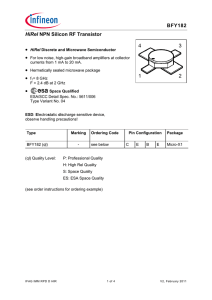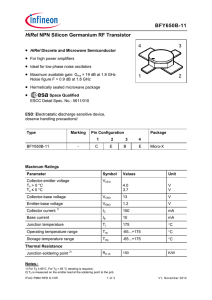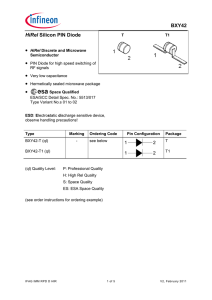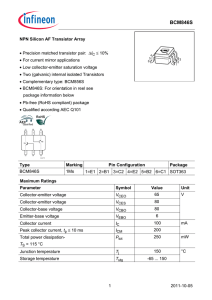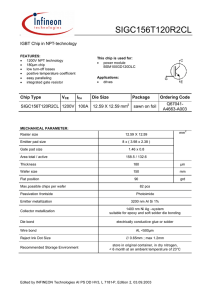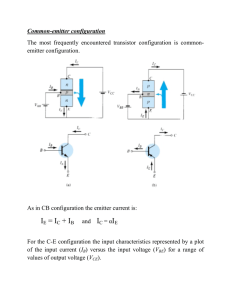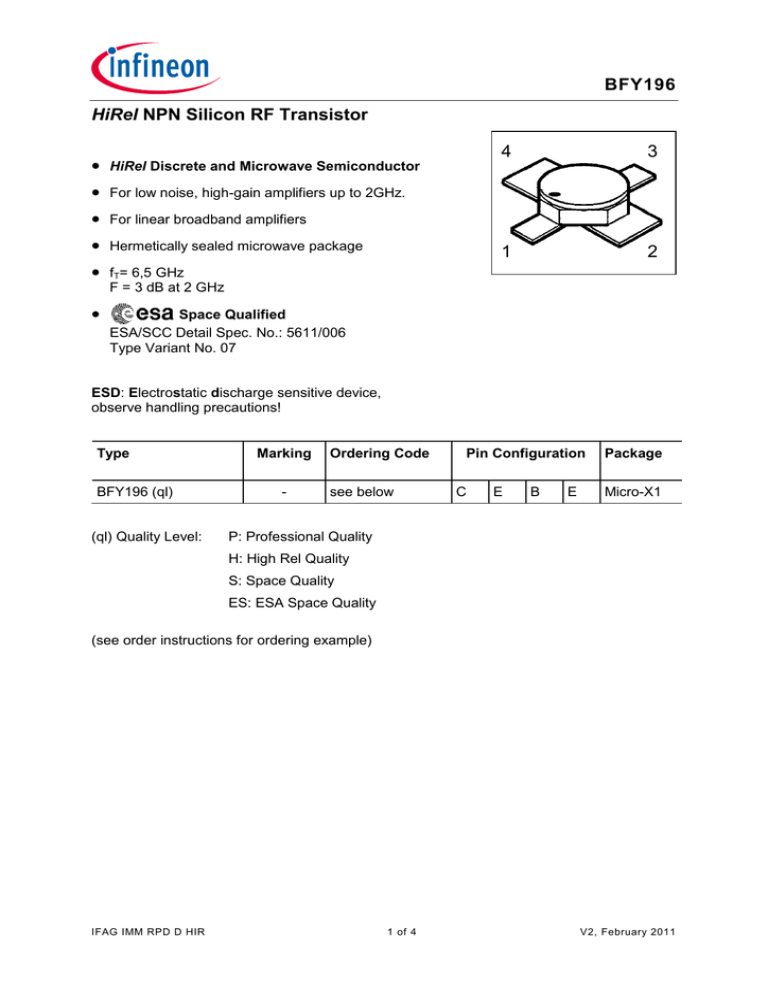
BFY196
HiRel NPN Silicon RF Transistor
HiRel Discrete and Microwave Semiconductor
For low noise, high-gain amplifiers up to 2GHz.
For linear broadband amplifiers
Hermetically sealed microwave package
4
3
1
2
fT= 6,5 GHz
F = 3 dB at 2 GHz
Space Qualified
ESA/SCC Detail Spec. No.: 5611/006
Type Variant No. 07
ESD: Electrostatic discharge sensitive device,
observe handling precautions!
Type
BFY196 (ql)
(ql) Quality Level:
Marking
-
Ordering Code
see below
Pin Configuration
C
E
B
E
Package
Micro-X1
P: Professional Quality
H: High Rel Quality
S: Space Quality
ES: ESA Space Quality
(see order instructions for ordering example)
IFAG IMM RPD D HIR
1 of 4
V2, February 2011
BFY196
Maximum Ratings
Parameter
Symbol
Values
Unit
Collector-emitter voltage
VCEO
12
V
Collector-emitter voltage, VBE=0
VCES
20
V
Collector-base voltage
VCBO
20
V
Emitter-base voltage
VEBO
2
V
Collector current
IC
100
mA
1)
Base current
IB
12
mA
Total power dissipation,
TS 105°C 2), 3)
Ptot
700
mW
Junction temperature
Tj
200
C
Operating temperature range
Top
-65...+200
C
Storage temperature range
Tstg
-65...+200
C
Rth JS
< 135
K/W
Thermal Resistance
Junction-soldering point
3.)
Notes.:
1) The maximum permissible base current for VFBE measurements is 50mA (spotmeasurement duration < 1s)
2) At TS = + 105 °C. For TS > + 105 °C derating is required.
3) TS is measured on the collector lead at the soldering point to the pcb.
Electrical Characteristics
at TA=25°C; unless otherwise specified
Parameter
Symbol
Values
Unit
min.
typ.
max.
ICBO
-
-
100
µA
ICEX
-
-
1000
µA
ICBO
-
-
50
nA
IEBO
-
-
25
A
IEBO
-
-
0.5
A
DC Characteristics
Collector-base cutoff current
VCB = 20 V, IE = 0
Collector-emitter cutoff current
VCE = 12 V, IB = 1µA
1.)
Collector-base cutoff current
VCB = 10 V, IE = 0
Emitter base cuttoff current
VEB = 2 V, IC = 0
Emitter base cuttoff current
VEB = 1 V, IC = 0
Notes:
1.) This Test assures V(BR)CE0 > 12V
IFAG IMM RPD D HIR
2 of 4
V2, February 2011
BFY196
Electrical Characteristics (continued)
Parameter
Symbol
Values
Unit
min.
typ.
max.
VFBE
-
-
1
V
hFE
50
100
175
-
fT
6
6.5
-
GHz
CCB
-
1
1.3
pF
CCE
-
0.44
-
pF
CEB
-
3,6
4,3
pF
F
-
3
3.5
dB
10
11
-
dB
|S21e|2
4
5
-
dB
POUT
18.5
19.5
-
dBm
DC Characteristics
Base-Emitter forward voltage
IE = 50 mA, IC = 0
DC current gain
IC = 50 mA, VCE = 8 V
AC Characteristics
Transition frequency
IC = 70 mA, VCE = 5 V, f = 500 MHz
Collector-base capacitance
VCB = 10 V, VBE = vbe = 0, f = 1 MHz
Collector-emitter capacitance
VCE = 10 V, VBE = vbe = 0, f = 1 MHz
Emitter-base capacitance
VEB = 0.5V, VCB = vcb = 0, f = 1 MHz
Noise Figure
IC = 20 mA, VCE = 5 V, f = 2 GHz,
ZS = ZSopt
Power gain
Gma
1.)
IC = 70 mA, VCE = 5V, f = 2 GHz
ZS = ZSopt , ZL= ZLopt
Transducer gain
IC = 70 mA, VCE = 5 V, f = 2 GHz
ZS = ZL = 50
Output Power
IC = 80 mA, VCE = 5 V, f = 2 GHz ,
PIN=15 dBm, ZS = ZL = 50
Notes.:
1)
Gma
S 21
( k k 2 1) ,
S12
IFAG IMM RPD D HIR
Gms
S 21
S12
3 of 4
V2, February 2011
BFY196
Micro-X1 Package
4
Edition 2011-02
3
Published by
Infineon Technologies AG
1
2
85579 Neubiberg, Germany
© Infineon Technologies AG 2011
All Rights Reserved.
Attention please!
The information given in this document shall in no event be regarded as a guarantee of
conditions or characteristics (“Beschaffenheitsgarantie“). With respect to any examples or
hints given herein, any typical values stated herein and/or any information regarding the
application of the device, Infineon Technologies hereby disclaims any and all warranties and
liabilities of any kind, including without limitation warranties of non-infringement of intellectual
property rights of an third party.
Information
For further information on technology, delivery terms and conditions and prices please
contact your nearest Infineon Technologies Office (www.infineon.com).
Warnings
Due to technical requirements components may contain dangerous substances. For
information on the types in question please contact your nearest Infineon Technologies
Office.
Infineon Technologies Components may only be used in life-support devices or systems with
the express written approval of Infineon Technologies, if a failure of such components can
reasonably be expected to cause the failure of that life-support device or system, or to affect
the safety or effectiveness of that device or system.
Life support devices or systems are intended to be implanted in the human body, or to
support and/or maintain and sustain and/or protect human life. If they fail, it is reasonable to
assume that the health of the user or other persons may be endangered.
IFAG IMM RPD D HIR
4 of 4
V2, February 2011

